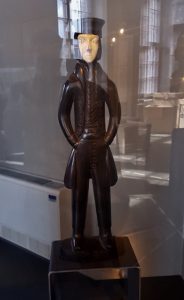July 04 2017, Dresden, second day of the summer school.
by Konstantin Biehl
We visited the #Prolog1-10 exhibition in the Japanese Palais in Dresden that day. We explored the exhibitions different stages. Each offering a different approach to otherness. Each covered by one group. After that and a mandatory discussion where we shared our experiences with the other groups, I explored the exhibition on my own. I got stuck at #Prolog6 where artistic representations of men of the west where displayed. I was not thinking much about representation when I stood transfixed in front of one specific show-case.
 I stared at him. Got lost beyond time for a glimpse… But too soon I was pulled out of my thoughts and had to hurry up because of our last assignment: To walk back through the way of passage at the beginning of the exhibition.
I stared at him. Got lost beyond time for a glimpse… But too soon I was pulled out of my thoughts and had to hurry up because of our last assignment: To walk back through the way of passage at the beginning of the exhibition.
But there I could not focus on my task or any of the figures/sculptures/ artefacts/masks.
I still thought of this pale handsome stranger in his black coat.
I had to go back to the end of the exhibition to see him again.
I could describe its/his features. The black of his body. His white mask-like face. The strange material…
Is he a black man with a white mask or a white man with a black coat? Is he a man at all – just because they say so?
Does it matter? And does it work like this? Would that describe my love?
A sailor he is, they say. From British Columbia. Or is he not a sailor but a representation of a white sailor from the perspective of a Native American artist?
Like I do not love a sailor nor the little statue but my own picture of it. An idea.
Leon Antonio Rocha offers a corresponding reading of love from Slavoj Žižek (2009, 355):
To this I can only offer a quip on ‘love’: perhaps, I love someone (or some ‘thing’) not because it happens to gather all (or most) of the properties that are worthy of love, but because I believe it contains a ‘kernel’ such that all (or most) of its properties appear worthy of love. And that kernel is the ‘truth’, the answers to my dilemmas: in psychoanalytic terms it is identity, the question of who I am. (Rocha 2016, 33).
So do I only love myself in the end?
Anyway. I want to own him. Let him guard my sleep. Gaze at him in the morning.
I wonder how well the Japanese Palais is protected at night?
References
Žižek, Slavoj (2009): The Parallax View. Cambridge, MA: MIT Press, p. 355):
Rocha, Leon Antonio (2016): How deep is love? The engagement with India in Joseph Needham’s historiography of China. The British Journal for the History of Science: Themes 1: 13–41, quote from page p.33.
